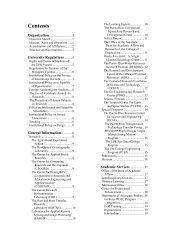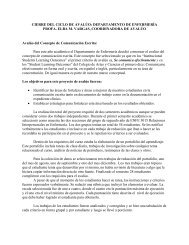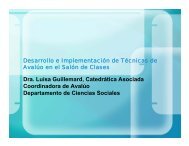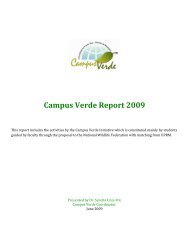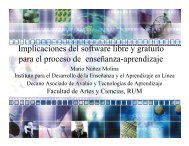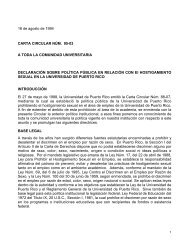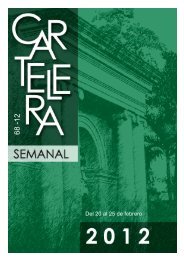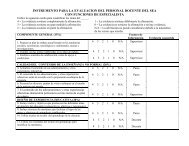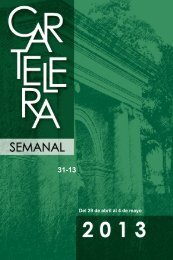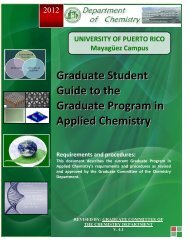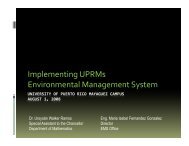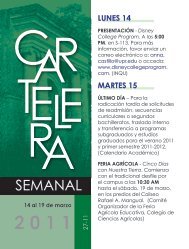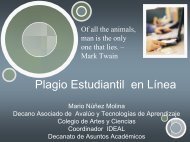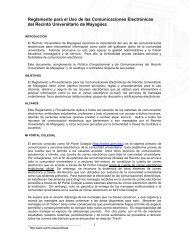Undergraduate Catalogue - UPRM
Undergraduate Catalogue - UPRM
Undergraduate Catalogue - UPRM
Create successful ePaper yourself
Turn your PDF publications into a flip-book with our unique Google optimized e-Paper software.
COLLEGE OF ENGINEERING<br />
INGE 4035. NUMERICAL METHODS<br />
APPLIED TO ENGINEERING. Three credit<br />
hours. Three hours of lecture per week.<br />
Prerequisites: (MATE 3063 or MATE 3185) and<br />
INGE 3016.<br />
Numerical procedures for digital computer<br />
simulation of engineering problems. The course<br />
includes numerical methods for finding roots of<br />
equations commonly encountered in engineering<br />
problems, curve fitting and modeling of<br />
experimental data, quadrature and numerical<br />
differentiation. Systems of linear and non-linear<br />
equations arising from engineering applications,<br />
solution of initial value problems applied to the<br />
fundamental laws of mechanics.<br />
INGE 4998. UNDERGRADUATE RESEARCH.<br />
One to six credit hours. Three to twenty-four hours<br />
of laboratory per week. Pre-requisite: Fourth or<br />
fifth year student and authorization of the Director<br />
of the Department.<br />
Participation, under the supervision of a faculty<br />
member acting as an investigator, in a research<br />
project.<br />
Advanced <strong>Undergraduate</strong> Course<br />
INGE 5015. THEORY AND MANAGEMENT<br />
OF SYSTEMS. Three credit hours. Three hours of<br />
lecture per week. Prerequisite: third year standing<br />
or higher.<br />
Introduction to the systems approach and to<br />
systems analysis. Analytical methods applicable to<br />
interactive contexts, such as economic and<br />
ecological systems and to organizations. Topics<br />
include: Problem formulation, information<br />
management, evaluation and selection of<br />
alternatives, implementation and monitoring of<br />
solutions.<br />
DEPARTMENT OF<br />
CHEMICAL ENGINEERING<br />
Chemical Engineering is the branch of<br />
engineering that serves those industries which<br />
convert chemically basic raw materials into a<br />
variety of products at a large scale. It applies the<br />
principles of conservation of mass, energy, and<br />
momentum together with the fundamental<br />
principles of engineering, mathematics,<br />
chemistry, physics, life sciences, economics, and<br />
social sciences, to the development of the<br />
optimum use of natural resources.<br />
The education of the chemical engineer is broad,<br />
concerning a range of problems which vary<br />
from basic and applied research, technical<br />
feasibility, and economic evaluation to plant and<br />
equipment design, construction, operation, and<br />
troubleshooting. A chemical engineer may also<br />
be concerned with other activities such as<br />
product sales, management, consulting, patent<br />
law and environmental planning.<br />
Chemical engineers play an important role in<br />
today’s world by attempting to solve problems in<br />
areas such as environment, renewable energy<br />
technologies, food, medical, biotechnology, and<br />
new materials development.<br />
This program is fully accredited by ABET, the<br />
Accreditation Board for Engineering and<br />
Technology. The information below follows the<br />
new ABET 2000 EC accreditation Criteria:<br />
Mission<br />
“Satisfy the technological needs of Puerto Rico<br />
related with Chemical Engineering by means of<br />
research, services and educating students coming<br />
from all socioeconomic levels to convert them in<br />
professionals competitive at a worldwide level<br />
and knowledgeable of their social and ethical<br />
responsibility.”<br />
Attain the following mission supportive<br />
objectives:<br />
1. Educate students to practice competently,<br />
professionally, and with social<br />
responsibility.<br />
2. Integrate education, research, and<br />
community services as main responsibility<br />
areas.<br />
270 <strong>Undergraduate</strong> <strong>Catalogue</strong> 2004-2005



